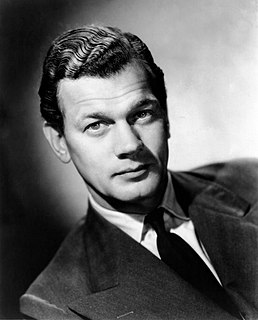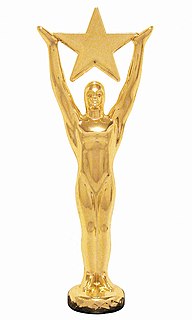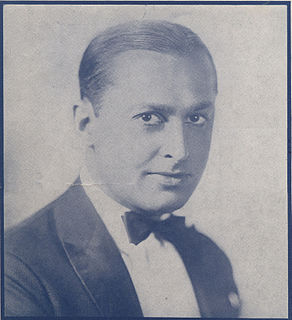
Doris Day was an American actress, singer, and animal welfare activist. She began her career as a big band singer in 1939, achieving commercial success in 1945 with two No. 1 recordings, "Sentimental Journey" and "My Dreams Are Getting Better All the Time" with Les Brown & His Band of Renown. She left Brown to embark on a solo career and recorded more than 650 songs from 1947 to 1967.

Joseph Cheshire Cotten Jr. was an American film, stage, radio and television actor. Cotten achieved prominence on Broadway, starring in the original stage productions of The Philadelphia Story and Sabrina Fair.

Milton Berle was an American actor and comedian. Berle's career as an entertainer spanned over 80 years, first in silent films and on stage as a child actor, then in radio, movies and television. As the host of NBC's Texaco Star Theatre (1948–1955), he was the first major American television star and was known to millions of viewers as "Uncle Miltie" and "Mr. Television" during the first Golden Age of Television. He was honored with two stars on the Hollywood Walk of Fame for his work in both radio and TV.

Edgar John Bergen was an American actor, comedian, vaudevillian and radio performer, best known for his proficiency in ventriloquism and his characters Charlie McCarthy and Mortimer Snerd. He was the father of actress Candice Bergen.

Richard Ewing Powell was an American actor, musician, producer, director, and studio head. Though he came to stardom as a musical comedy performer, he showed versatility, and successfully transformed into a hardboiled leading man, starring in projects of a more dramatic nature. He was the first actor to portray private detective Philip Marlowe on screen.

The Young Artist Award is an accolade presented by the Young Artist Foundation, a nonprofit organization founded in 1978 to honor excellence of youth performers, and to provide scholarships for young artists who may be physically disabled or financially unstable.

Julia Frances Newbern-Langford was an American singer and actress who was popular during the Golden Age of Radio and made film and television appearances for over two decades.

Benjamin Anzelwitz, known professionally as Ben Bernie, was an American jazz violinist, bandleader, and radio personality, often introduced as "The Old Maestro". He was noted for his showmanship and memorable bits of snappy dialogue, being part of the first generation of "stars" of American popular music, alongside other artists such as Paul Whiteman, Ted Lewis and Al Jolson.

Beverly Lucy Garland was an American actress. Her work in feature films primarily consisted of small parts in a few major productions or leads in low-budget action or science-fiction movies. On television, however, she had prominent recurring roles on several popular series.

Edmund Lincoln Anderson was an American comedian and actor. To a generation of early radio and television comedy he was known as "Rochester".
Reelz is an American digital cable and satellite television network owned by Hubbard Broadcasting. The network's programming was formerly devoted to entertainment-oriented programming focusing on the Hollywood film and entertainment industry, with programs featuring information on theatrical film releases as well as information on movies released on DVD and airing on cable television. Currently, outside a few entertainment programs, repeats of the Oxygen series Snapped, and some reality series and films, the network mainly airs original and acquired films, series, and documentaries about celebrity scandals.

Francis Curray McHugh was an American stage, radio, film and television actor.

Lurene Tuttle was an American actress and acting coach, who made the transition from vaudeville to radio, and later films and television. Her most enduring impact was as one of network radio's more versatile actresses. Often appearing in 15 shows per week, comedies, dramas, thrillers, soap operas, and crime dramas, she became known as the "First Lady of Radio".

Duane Thompson was an American film actress during Hollywood's silent film era. When Talkies pushed silent films into the background, she worked in stock theater for a time before moving to radio drama. She was married twice, to comedian Buddy Wattles and to radio producer William T. Johnson.
Four star, 4 star, **** or similar may refer to:

Hollywood Hotel is a 1937 American romantic musical comedy film, directed by Busby Berkeley, starring Dick Powell, Rosemary Lane, Lola Lane, Hugh Herbert, Ted Healy, Glenda Farrell and Johnnie Davis, featuring Alan Mowbray and Mabel Todd, and with Allyn Joslyn, Grant Mitchell and Edgar Kennedy.

Alexandra Anna Daddario is an American actress. She had her breakthrough portraying Annabeth Chase in the Percy Jackson film series (2010–2013). She has since starred as Paige in Hall Pass (2011), Heather Miller in Texas Chainsaw 3D (2013), Blake Gaines in San Andreas (2015), Summer Quinn in Baywatch (2017), and Alexis Butler in We Summon the Darkness (2019). She has also guest starred in television series such as White Collar, It's Always Sunny in Philadelphia, True Detective, New Girl, and American Horror Story: Hotel. In 2021, she starred in the first season of the HBO series The White Lotus, for which she received widespread critical acclaim.

The Hollywood Roosevelt Hotel is a historic hotel located at 7000 Hollywood Boulevard in the Hollywood district of Los Angeles, California. It opened on May 15, 1927, and is the oldest continually operating hotel in Los Angeles.
Hollywood Hotel is an American radio program that was broadcast in the 1930s. It featured Hollywood stars in dramatized versions of then-current movies and "helped to make Hollywood an origination point for major radio programs." Radio historian John Dunning called the program, sponsored by Campbell Soup Company, "the most glamorous show of its time." The program was the inspiration for the 1937 Warner Brothers movie of the same title, which featured Louella Parsons as herself.
Hollywood Star Time was a radio interview program in the United States. It was initially broadcast on 20 Pacific Coast and Rocky Mountain stations beginning February 28, 1944. Later the 15-minute program was carried nationwide on the Blue Network May 29, 1944 – November 24, 1944.















